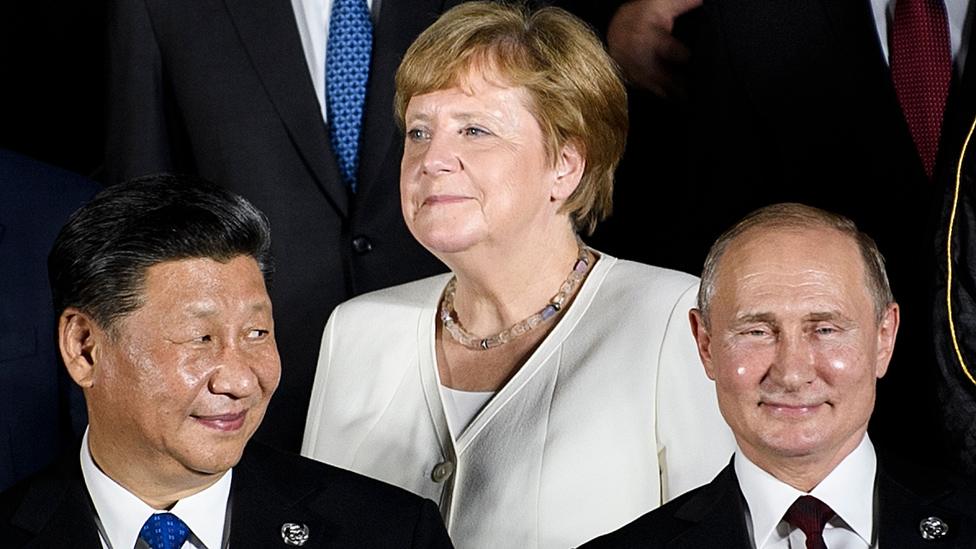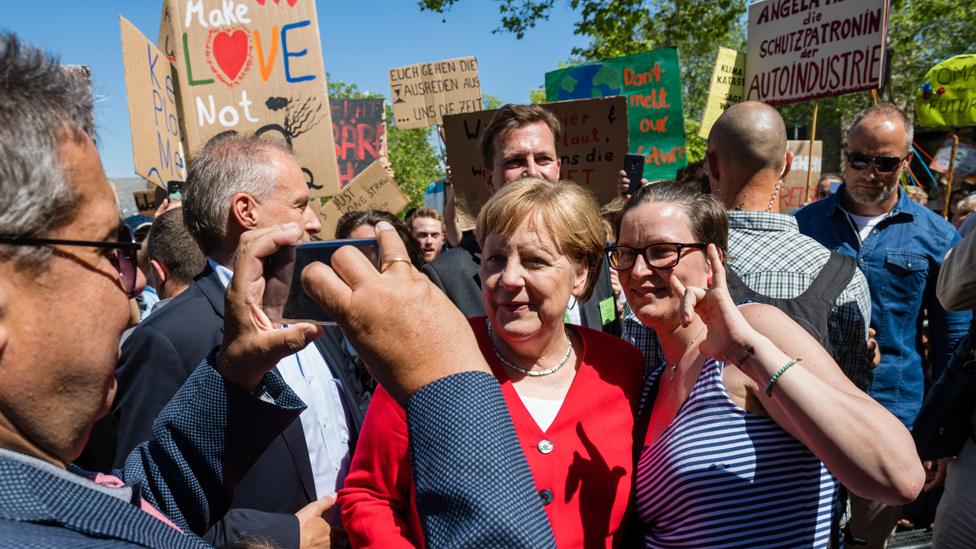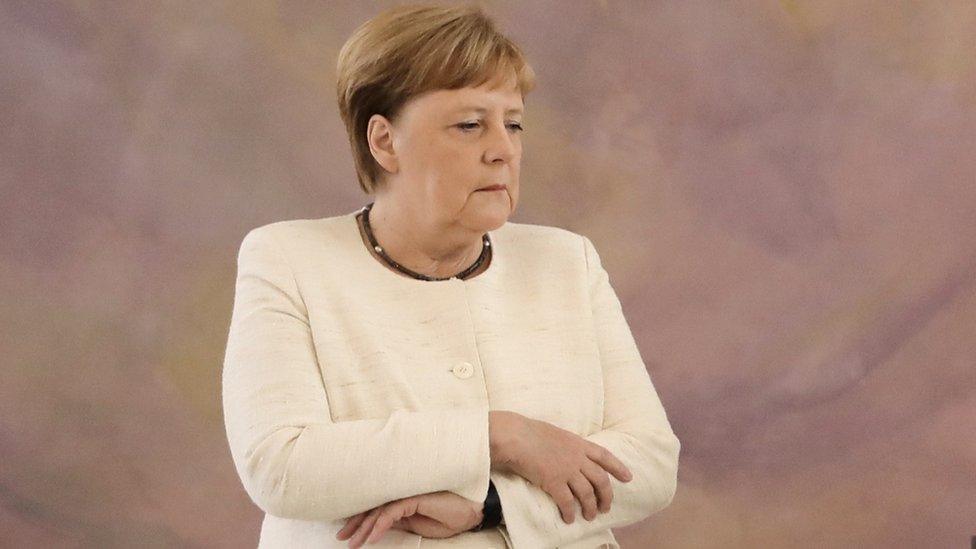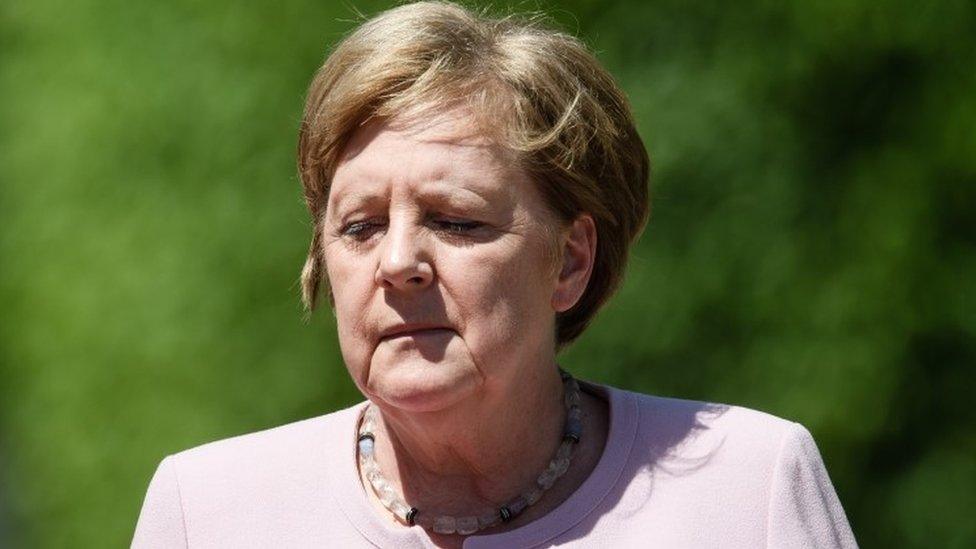Merkel's shaking: Why Germans feel so protective
- Published
Angela Merkel seen shaking during ceremony in Berlin
Chancellor Angela Merkel earned the nickname "Mutti" (Mummy) among her German admirers, and her new bout of trembling has clearly made many feel protective towards her.
The uncontrollable shaking, as she stood next to President Frank-Walter Steinmeier at a ceremony in Berlin, was her second bout in public in less than two weeks.
It lasted about two minutes, but she appeared to get over it quickly: she went on to a parliament session and flew off to Japan for the G20 and meetings with other world leaders. She turns 65 next month.
The trembling was front-page news in Bild, Germany's popular tabloid daily, but many other German news outlets simply repeated a short news agency report on it.
Public broadcasters ARD and ZDF ran the news briefly and quite low down in their bulletins.
Why privacy is so important
Restraint in reporting politicians' health is linked to Germans' general concern for personal privacy. Germans were traumatised by intrusive surveillance under Nazi and communist rule in the 20th Century.

Mrs Merkel is now in Osaka, Japan, with other world leaders at the G20 summit
A top editor at conservative daily Frankfurter Allgemeine Zeitung, Berthold Kohler, wrote: "The vultures are already circling on the web, happy that Merkel is also reaching the end physically. She can ignore their screeching."
However, he also said it was legitimate to wonder about a leader's health. The terse comment from her spokesman that "she is doing well" was no longer good enough, Kohler argued.
Mrs Merkel has made it clear she intends to quit politics in 2021, once her fourth term as chancellor ends. She has been in the top job since 2005, enduring considerable stress and a gruelling schedule.
"I'm a bit like a camel in the way I handle sleep - a not unimportant ability in this job," she was quoted as saying last year by Die Zeit.
"I can manage with very little sleep for five or six days at a stretch. Then I need a day again to get 10 or 12 hours' good sleep."

Why Merkel's health is a political issue
BBC Berlin correspondent Jenny Hill writes:
Angela Merkel's robust constitution has become almost a political entity in itself; she is famous for her ability to endure all-night negotiating sessions, as well as a punishing daily schedule.
So the sight of Mrs Merkel struggling to control tremors was a shock for many Germans. Speculation about the cause ranges from burnout to something far more serious.
18 June: Mrs Merkel was seen trembling and later said she had been dehydrated
Germans are protective of their privacy and commentators are divided as to whether the chancellor's health should even be a matter for public discussion.
Behind the scenes in Berlin, the tea rooms and bars are rife with gossip. MPs are about to go on summer recess, but concerns about Mrs Merkel's health have intensified speculation about who might one day replace her.
The woman widely seen as her anointed heir, Annegret Kramp-Karrenbauer, has made a series of public gaffes and many in Mrs Merkel's Christian Democrat (CDU) party fear no one is yet up to the job of chancellor.
As one politician put it, if there is something seriously wrong with her health, "it would be a disaster for her, a disaster for her party and a disaster for the country".

Merkel no ordinary individual
Jutta Bielig, a presenter on commercial TV channel RTL, said it would be nice to let Mrs Merkel keep her health issues private, as other people do, "but it's not as simple as that".
"The chancellor is not like just any other individual. Her health is a political issue, even if one would love to spare her that."
Mrs Merkel blamed dehydration for her first shaking bout, on 18 June, saying she had drunk too much coffee and too little water on a hot day.
The next day she met locals and posed for selfies in Goslar, a central town, apparently her usual self.

19 June: Mrs Merkel mixed with a crowd in Goslar a day after her first shaking bout
Doctors quoted in German media played down speculation about possible Parkinson's disease; they said dehydration or some kind of infection could have been the trigger.
On German news channel n-tv Dr Christoph Specht said the second bout might have been anxiety-induced, as Mrs Merkel was standing at a ceremony again, perhaps thinking about her earlier shaking fit.
How Germans have reacted
There were many supportive comments from Germans on social media.
"Whoever jokes about Merkel's shaking bout is a wicked person. Political differences stop when it's a question of health. Get well," tweeted Julius Scheil, external.
A user called s3bkun tweeted, external: "Whether you like her politics or not: we're talking about a human being. So drop your mocking and jokes. If Mrs #Merkel, external really has something more serious, despite other statements, it's still basically not our business. Get well Chancellor!"
A close ally of Mrs Merkel, CDU politician Elmar Brok, told the BBC that, when he met her on 24 June, "I had a lot of feeling that she was in bad shape". But he noted that "now it's 40C in Germany, and things can happen".
Commenting on German media's restrained coverage, he said: "it's a private thing, it shouldn't be part of headlines."
"In my experience this is tabloids. This question of privacy is taken more into account in Germany traditionally."
Mrs Merkel likes to go for walks at the weekend, when she can find time, but she does not go in for sport.

President John F Kennedy's many health problems were kept secret
Why health taboo is not just German
Her predecessor as CDU leader and chancellor, Helmut Kohl, once endured agony from a prostate tumour - in secret - while attending a party conference where he faced a strong leadership challenge.
Die Welt news website reported , externalthat in 1989 Kohl sat on the CDU podium "listening to long-winded speeches and counter-attacks, in a fog of pain, and stayed until the last vote".
The tradition of restraint, or secrecy, about political leaders' health goes far beyond Germany, however.
The full scale of President John F Kennedy's ill health did not emerge until 2002, when some key records were released.
US broadcaster PBS reported, external that Kennedy took an extraordinary amount of medication during his presidency.
- Published27 June 2019

- Published18 June 2019
